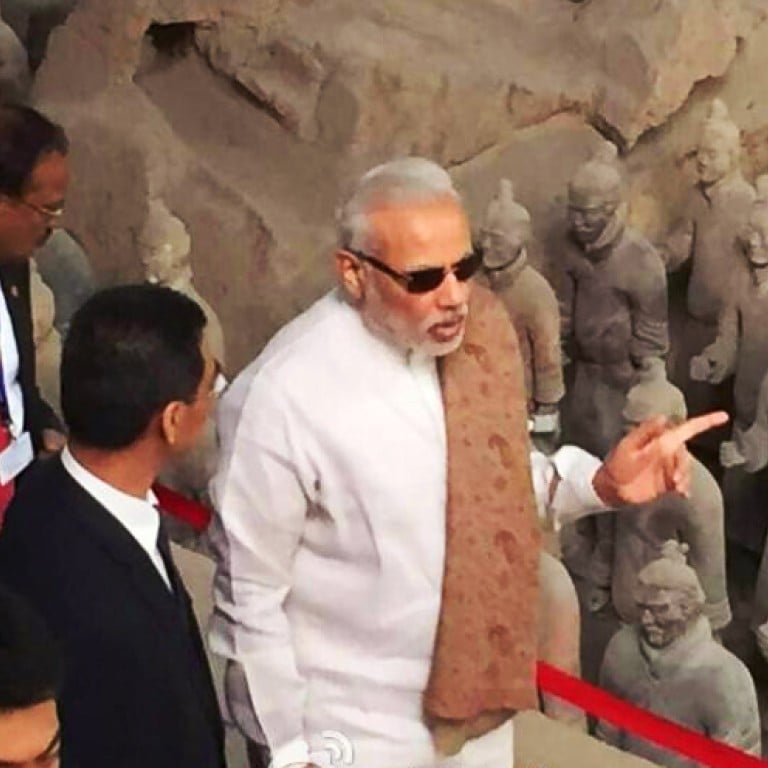
Update | Yoga and Modi's soft-power position on China
Narendra Modi's three-day visit, which will include talks with President Xi Jinping, will help underscore the strong cultural and religious ties between the two countries, say analysts
Buddhism and yoga will form part of Indian Prime Minister Narendra Modi’s soft power diplomacy as he visits China today and tries to increase his nation’s influence in the world’s second-largest economy.
Modi, who heads a 50-strong delegation, arrived in the ancient city of Xian – the home town of President Xi Jinping – this morning at the start of a three-day trip.
The close personal rapport between the two leaders will be on show, despite a festering border dispute that has coloured relations between the two countries.
Kicking off the trip, Modi visited the site of Emperor Qin Shi Huang’s Terracotta Army, a world heritage site, according to pictures posted on his official Twitter account. This was after he was greeted on the airport tarmac by a dancing troupe.
The Indian leader was also set to see the Giant Wild Goose Pagoda – a structure built to highlight the 7th century Chinese Buddhist monk Xuan Zang’s journey to India.
Xi joined him later in Shaanxi. The choice of the president’s home town as the first stop of Modi’s China visit, which will also take him to Beijing on Friday and Shanghai on Saturday, is viewed as a reciprocal gesture by China following Xi’s visit to India in September, when he was invited by Modi to visit his home province of Gujarat.

Ahead of his trip, Modi said he firmly believed “this visit to China will strengthen the stability, development and prosperity of Asia”.
“I am confident my visit will lay the foundation for further enhancing economic cooperation with China in a wide range of sectors,” he wrote on his official Twitter page last week.
China is India’s biggest trading partner with two-way commerce totalling US$71 billion last year. But India’s trade deficit with China has soared from just US$1 billion in 2001-02 to more than $38 billion last year, Indian figures show.
Another highlight of the trip will see Modi and Premier Li Keqiang watch a joint demonstration of tai chi and yoga tomorrow at the Temple of Heaven – built in 1420 during the Ming dynasty for the worship of the God of Heaven.
Modi’s itinerary is widely regarded as a sign of the two nations jockeying to demonstrate their soft power – particularly India, which established a ministry last November to promote yoga and the Ayurveda system of Hindu traditional medicine.
Indian officials said the activity planned to show that both nations were the oldest civilisations.
Before a private dinner with Xi, Modi is expected to present a sapling of the holy Bodhi tree from Bodh Gaya to the Xian government to signal the religious ties that bind India and China.
“These mutual visits to one another’s home towns have been used to underscore how the visitors have been paying attention to each other and also signal their efforts to build stronger ties between them,” said Dali Yang, professor of political science at the University of Chicago.
He said Xian was not simply another Chinese city but an ancient capital that was both open and cosmopolitan.
Modi’s visit would help to underscore the strong cultural and religious ties between the two countries, he said. “These symbolic moves are important for promoting mutual understanding and exchange.”
As part of his charm offensive, Modi launched a microblog account on Chinese social media on May 5.
Three days before Modi’s visit, Bollywood film star Aamir Khan arrived in Beijing for the nationwide commercial release of his latest blockbuster PK, which has been dubbed into Putonghua in an attempt to strike a chord with a young Chinese audience.
However, ties between the world’s two most populous countries have been strained over a Himalayan border dispute that saw the two nations fight a brief, bloody war in 1962. Earlier this week an op-ed in the Global Times, affiliated with Communist Party mouthpiece People’s Daily, accused the Indian leader of “playing little tricks over border disputes and security issues”.
After China, Modi will head to Mongolia and South Korea.
With additional reporting by Agence France-Presse

